- Home
- S. D. Perry
Resident Evil Page 8
Resident Evil Read online
Page 8
“Edward’s radio,” she said. “He had it before he—it should still be on him.”
Billy was already turning toward the door. “I’ll get it on the way.”
“Be careful,” she said.
He nodded, casting another look out the window. “Just be ready to hit the brakes up here. I have the feeling we’re going to stop pretty soon anyway, one way or another.”
He opened the door to a blast of noise, then was gone.
The seconds ticked by. Rebecca made sure her radio was receiving, then kept her hand on the brake lever, staring out at the onrushing night. The train took a curve too fast and she closed her eyes for a beat, willing the out-of-control engine to stay on the track, imagining that she could actually feel the wheels rise up and then fall back into place. Billy was right; one way or another, they weren’t going to be going much farther.
What’s taking so long? It had only been a few minutes, but that was long enough. She grabbed the radio, pressed transmit.
“Billy, come in. What’s your status, over.”
Nothing.
“Billy?” She waited, counted slowly to five, her heart starting to trip over itself. She could see another curve coming up ahead. “Billy, come in!”
Shit! Maybe he hadn’t found the radio, or had forgotten to turn it on. Or there was something wrong with the controls, he couldn’t activate the terminal.
Or maybe he’s dead. Maybe something got to him.
The train railed around the curve, and this time there was no imagining; the train tipped too heavily, racing ever faster as it rattled back down, and another curve like that one, it was all over. She’d have to go back herself, there was no time but there was no other option, either—
“Rebecca, now!”
Rebecca saw a blur to the right of the train, there and gone so quickly that she didn’t know what it was until it was past—a station platform. The station platform, and that meant the only thing left ahead was wherever they stored the goddamn thing, and that meant it might already be too late.
“Hang on!” she shouted at the radio, grabbing the brake lever, twisting it as hard as she could—and something was rushing at the front window, a darkness deeper than the night, a tunnel. The brakes were squealing, screaming as the train roared into the black, broke through some flimsy barrier, wood flying across the windshield, the train tipping again, this time not tipping back.
Rebecca heard her own scream join the train’s as they hit the ground and started to slide, metal rending, sparks flaring up like hellish fireworks. The wall became the floor, Rebecca slamming into it as the engine slammed into something even harder and all the lights went out.
SIX
Billy woke up to pain and the smell of burning synthetics. He opened his eyes, blinking, assessing his surroundings as quickly as his muddled mind could manage, which wasn’t very quickly at all. He was on his back, looking up at a high, blank ceiling. Firelight flickered all around him, shadows of rubble and rock dancing across part of a wall to his left. Somehow, he was inside.
The brakes, the train... Rebecca?
That woke him up. He pushed himself to a sitting position, was surprised and relieved to realize he had a strained shoulder and a few scrapes, but nothing worse.
“Rebecca?” he called, and coughed. Wherever he was, the billowing smoke from the wreck was starting to build up. He, they, had to move.
He stood, cradling his right arm as he looked around. The train had crashed into a warehouse, it looked like—a giant, empty space, concrete, a scaffolding off to one side, a few hooded lights overhead. It wasn’t very well lit, but when he looked down, he saw a dented train track beneath his feet, and realized they had probably crashed into the train’s maintenance terminal. Wherever that was.
“Rebecca?” He called again, surveying the wreckage. There were numerous piles of blasted concrete and puddles of burning oil all around. The engine was on its side, the other cars piled up behind it, blocking what had to be a monster hole in the wall. He had no idea where to look for the young S.T.A.R.S. member. As soon as he’d activated the rear brakes he had started running back toward the front; he must have been thrown from the back passenger car...
“Uunh.” A slumped shadow stirred near a pile of smoking rock.
“Rebecca!” He stumbled forward, hoping she was all right. She had sounded panicked when she’d called, when he hadn’t answered, but he’d been too busy punching buttons to talk. Now he was sorry; she was just a kid, after all, and had been scared shitless. I should have reassured her, something—
He reached the crumpled, battered body, and started to kneel beside her. She was face down, her clothes shredded.
“Billy?”
Billy turned, saw Rebecca walking toward him, her nine-millimeter in hand. She had a trickle of blood seeping from her hairline, but appeared to be in good shape otherwise—
—and the person in front of him rolled over, moaning again, reaching one bloody hand up to grasp at his face. Rotting fingers trailed across his cheek.
“Gah!” With a wordless cry of disgust he reeled back, fell on the floor. He couldn’t tell if the slow-moving creature was male or female, so much of its face and body had been damaged, either by the disease or from the crash. It crawled to its knees, turning its disfigured face toward Billy. Its mouth hung open, and blood-tinted drool poured from between its broken teeth as it reached for him again.
“Get clear,” Rebecca said, and he was only too glad to comply, scrambling backward on his hands, the loose handcuff digging painfully into the flesh of his left palm, pushing with his feet. She aimed and fired twice, both rounds finding the once-human’s already fractured skull, ending what was left of its life. It settled to the concrete with a sound almost like a sigh.
Billy stood up, and they both spent a few tense seconds scanning the wreckage for any other bodies. If there were more, they were hidden.
“Thanks,” he said, looking back at the pathetic creature. She’d spared it further suffering, at least—and with two clean head shots. He was surprised and not a little impressed at her level of skill. “Are you okay?”
“Yeah. I’ve got a killer headache, but that’s all. My second crash of the day, too.”
“Really?” Billy asked. “What was the first?”
She smiled, started to speak—then abruptly stopped, her expression turning cool, and Billy felt a pang of real unhappiness; she’d obviously remembered who she was talking to. In spite of everything, she still thought he was a mass murderer.
“It’s not important,” she said. “Come on. We should get out of here before the smoke gets any worse.”
They both still had their radios, and spent a moment looking for his gun, finding it half hidden by a crushed concrete block not far from where he’d woken up. The shotgun was history. Neither of them suggested searching the train for it; the small fires were dying out, but the thick layer of black smoke that hovered at the ceiling was growing by the minute.
They moved around the vast room, finding only a single door some twenty meters from the wrecked engine and very little else. Billy hoped it led to fresh air, to freedom for himself and safety for the girl. Standing at the door, he looked back at the smoldering crash, felt one corner of his mouth curve up.
“Well, at least we managed to stop the train,” he said.
Rebecca nodded, her smile weak but game. “We managed,” she replied.
They turned back to the door. Taking a deep breath, Billy reached out and turned the handle, pushing it open.
* * *
It was surreal, watching the train crash into the basement of the training facility on a screen, hearing the dull thunder of the crash a beat later. They felt it, too, a very faint rumble in the walls all around them. In seconds, the camera lens was obscured by smoke.
“We should get out of here, now,” Birkin said, pacing behind Wesker’s chair. He wasn’t worried about fire, the old terminal was practically made out of cement—but a trai
n crash was hard to miss, and not every cop and fireman in the vicinity was on Umbrella’s payroll. The facility was isolated, but it would only take a phone call from one concerned citizen and Umbrella’s bioweapons work would be exposed.
Wesker didn’t even seem to be listening. He tapped at the monitor controls, shifting camera perspectives through other parts of the facility, searching for something. He’d barely said a word since the final transmission from the cleanup crew.
“Are you listening to me?” Birkin asked, not for the first time in the past few minutes. He was tense, and Wesker’s cavalier attitude wasn’t helping.
“I hear you, William,” Wesker said, still watching the screens. “If you want to leave, leave.”
“Well? Aren’t you coming?”
“Oh, in a while,” he answered, his tone calm and even. “I just want to check on a few things.”
“Like what? I’d say the train is pretty much cleaned up. That’s why we came, isn’t it?”
Wesker didn’t answer, only kept watching the screens. Birkin’s hands clenched into fists. God, the man could be insufferable! That was the problem with sociopaths. The inability to empathize tended to make them completely self-centered.
I’ve got work to do, Birkin thought, looking toward the door. Work, a family... he wasn’t going to wait around for Joe Firefighter to come knocking, looking for an explanation as to why there were zombies wandering around the crash site...
“Ah, there we are,” Wesker said, thumbing a key beneath one of the screens. It was the main lobby of the facility, built to welcome execs and grunts alike into the less-than-legal world of White Umbrella.
And as they watched, a hand came up through the floor, pushing aside a square cover.
That’s the old access tunnel, leads from the terminal. Birkin leaned forward, curious in spite of himself.
A man with an elaborate tattoo on one arm crawled out of the dark square in the northwest corner of the room, followed by a small woman in a S.T.A.R.S. uniform, a girl, really. Both carried handguns, and looked around the finely decorated lobby with expressions Birkin couldn’t read from the small screen.
“Who on earth are those people?” he asked.
“The girl is a S.T.A.R.S. rookie, B team,” Wesker said. “No one of consequence. The male I don’t recognize.”
“Do you think—were they on the train?”
“Had to have been,” Wesker said.
Birkin felt a new surge of panic. “What are we going to do?”
Wesker glanced up at him, one eyebrow arched. “What do you mean?”
“They—she’s with S.T.A.R.S., and who knows who he’s working for. What if they escape?”
“Don’t be obtuse, William. They won’t escape. Even if the facility wasn’t locked down, the place is overrun with carriers. All they have to do is open a door or two, and they’ll cease to be of any concern.”
Wesker’s bland tone was chilling, but he had a point. The chances of anyone getting out of the facility were slim to none.
As they watched, the two intruders moved carefully around the big room, one of the only rooms in the building free of the infected, both sweeping their weapons side to side. After a thorough check, the girl walked up the grand staircase, stopping at the small landing mid-floor. There was a large portrait there of Dr. Marcus—and the girl seemed surprised by it, as though she recognized him. The tattooed man joined her, and Birkin could see him reading aloud from the small plaque beneath the portrait—DOCTOR JAMES MARCUS, FIRST GENERAL MANAGER.
Birkin shifted uncomfortably. He hated that picture. It reminded him of how he’d gotten his real start in Umbrella, not something he liked to think about—
“Attention. This is Doctor Marcus.”
Birkin jumped, looking around with wide eyes, his heart pounding. Wesker didn’t flinch, but turned up the sound on the console’s ancient intercom as the voice of a man ten years dead rang through the empty spaces and corridors of the entire complex.
“Please be silent as we reflect upon our company motto. Obedience breeds discipline. Discipline breeds unity. Unity breeds power. Power is life.”
The man and woman on the screen were looking around as well, but Birkin barely glanced in their direction. He grabbed Wesker’s shoulder, unnerved. It was a recording, one he hadn’t heard since he and Wesker had still been students at the facility. Where?—who?—
Wesker brushed his hand away, nodding toward the screen, where the picture was fading. It seemed to blink—and then they were looking at a young man in another location. Birkin didn’t recognize the room, but the young man staring back at them seemed almost familiar. He had long hair and dark eyes, was probably in his early twenties—and he had a sharp, cruel smile, as thin and cutting as a steel blade.
“Who are you?” Wesker asked, surely not expecting an answer, there was no audio set up—
The young man laughed, the sound pouring out of the intercom like dark silk. It wasn’t possible—he didn’t wear a headset, wasn’t near any part of the com system—but they could hear him clearly nonetheless.
“It was I who scattered the T-virus in the mansion,” he said, his voice cold. His smile sharpened. “Needless to say, I contaminated the train, too.”
“What?” Birkin blurted. “Why?”
The young man’s cold voice seemed to deepen. “Revenge. On Umbrella.”
He turned away from the camera, raising his arms to the shadows. Birkin and Wesker both leaned in, trying to see what he was doing, but they could only see movement in the darkness, hear something like water—
The young man turned back to look at them, his smile ever sharper—and from out of the shadows behind him stepped a tall, distinguished man in a suit and tie, his white hair slicked back, his features lined with age but powerful, commanding. It was the same face that graced the portrait in the lobby.
“Dr. Marcus?” Birkin gasped.
“Ten years ago, Dr. Marcus was murdered by Umbrella,” the young man said, his voice almost a snarl. “And you helped them. Didn’t you?”
He laughed again, that dark and silken laugh, a laugh that promised no mercy as Birkin and Wesker stared, stunned into silence by the visible, living presence of a man they’d watched die a decade earlier.
* * *
The young man sang, and the many, his children, turned the camera away, manipulated the controls that allowed his voice to travel. He’d said all he intended, at least for the moment; there was much to do, many choices to consider. Things were unfolding, always unfolding in new directions.
He sang a slower song and the image and body of Marcus collapsed, reverted to the children. They gathered at his feet, coursed up and over his body, stroking him, adoring him. Waiting for him to decide what was next.
There was no plan, beyond Umbrella’s destruction. He had and would continue to employ whatever means came to hand—the virus, the many, the false images that the many were capable of creating, like Marcus; he had been for Albert and William’s benefit, had undoubtedly left them afraid and confused.
The young man smiled. How fortuitous, that they of all people should be witness to the downfall. With luck, he would have the opportunity to see them expire, to stand by as they had once stood by, pitilessly watching their mentor in his last struggling moments... Though their deaths were meaningless in the grander picture. What mattered was that Umbrella would soon be no more.
He considered the man and woman from the train, how he might use them now that they’d entered the complex. His first inclination had been to kill them, to keep them from interfering, but that seemed a waste; after all, wasn’t Umbrella now their enemy, too? They would fight for their lives, fight to be free—and if they succeeded, they would draw immediate attention to the disaster, what he had always seen as the cross atop Umbrella’s grave. Destroying their laboratories, killing their employees—they could always build new labs, hire new people. Once the spotlight of the international press turned toward Umbrella, however, their ru
in would be complete... And the world would finally know his name.
The facility had been locked down, of course. It had been designed with almost as many door puzzles and concealed passages as Trevor’s mansion, built a decade earlier. Oswell Spencer, one of Umbrella’s co-founders, had been obsessed with spy movies and books, and as paranoid as any megalomaniac, which made for an extremely secure lockdown. There were hidden keys, doors that wouldn’t open without missing pieces, even a room or two designed to trap unwary intruders. It wouldn’t be easy for anyone to escape.
But there were other false men seeded throughout the complex, men created by the many, each prepared to infect any and all who came near; they had helped spread the virus in the first place. He could use them now to open the training facility, to collect keys and unlock doors, to ensure that the man and woman would at least have a chance to survive. It was a slight chance—the false men weren’t the only virus carriers roaming the halls—but they had already proven themselves to be more resilient than most.
The young man laughed, thinking of Albert and William, wondering what they were thinking; James Marcus’s brightest students, working damage control for Umbrella. After all these years. It was an irony beyond measure.
The children cooed, covered him, delighted in his laughter and sang their own sweet song, a song of chaos and interdependence as their cool, slick bodies, filled with the blood of his enemies, merged and enveloped him.
* * *
“...breeds power. Power is life.”
The powerful voice faded, the great hall falling silent once more. It had to be a recording or something, it didn’t sound live, but someone had turned it on—and she thought she had an idea of who. She turned her attention back to the portrait of Dr. Marcus and felt a shiver run down her spine.
“Well, that was creepy,” Billy said.
“Not as creepy as seeing him on the train,” Rebecca said, nodding at the portrait. “Made out of slime bugs.”

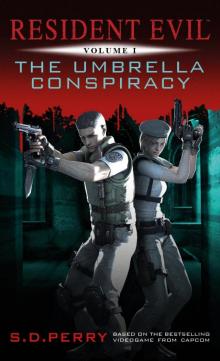 The Umbrella Conspiracy
The Umbrella Conspiracy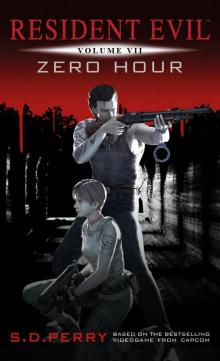 Zero Hour
Zero Hour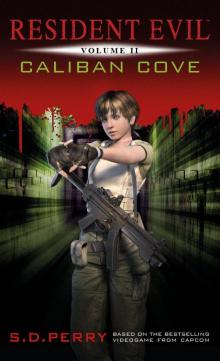 Caliban Cove
Caliban Cove Code: Veronica
Code: Veronica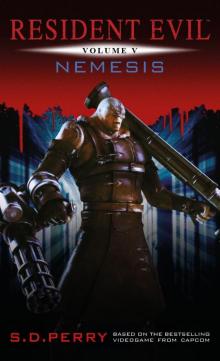 Nemesis
Nemesis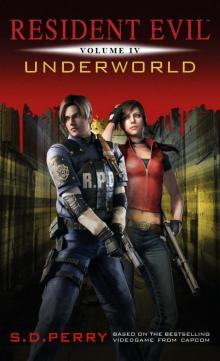 Underworld
Underworld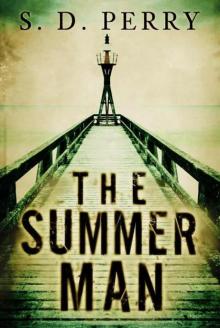 The Summer Man
The Summer Man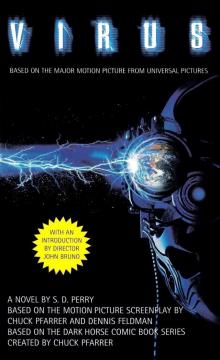 Virus
Virus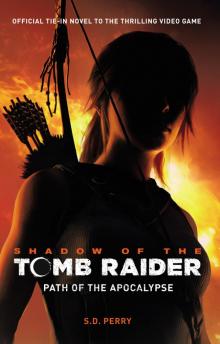 Shadow of the Tomb Raider--Path of the Apocalypse
Shadow of the Tomb Raider--Path of the Apocalypse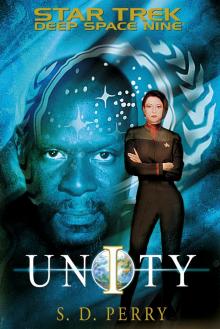 Unity
Unity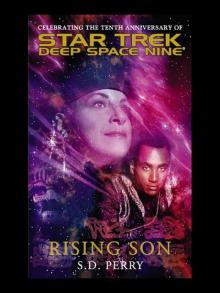 Rising Son
Rising Son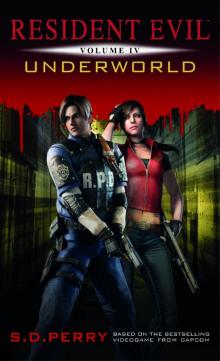 Resident Evil: Underworld
Resident Evil: Underworld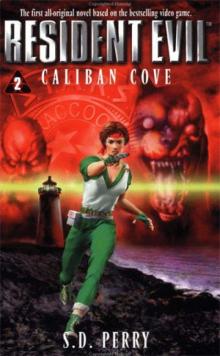 Resident Evil – Caliban Cove
Resident Evil – Caliban Cove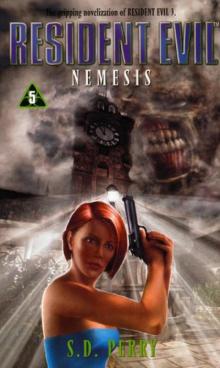 Resident Evil – Nemesis
Resident Evil – Nemesis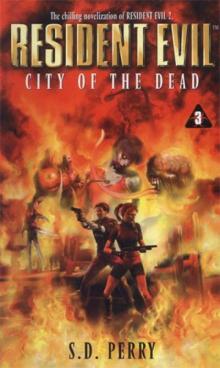 Resident Evil – City of the Dead
Resident Evil – City of the Dead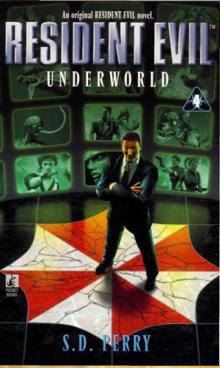 Resident Evil – Underworld
Resident Evil – Underworld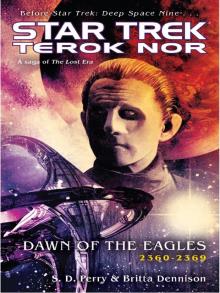 Star Trek: Terok Nor 03: Dawn of the Eagles
Star Trek: Terok Nor 03: Dawn of the Eagles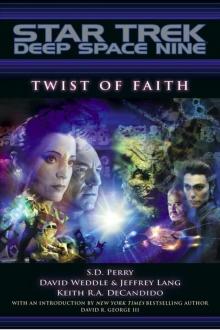 Twist of Faith
Twist of Faith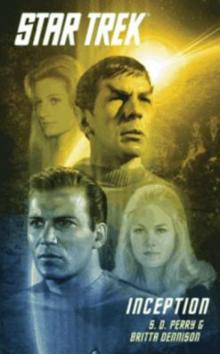 Star Trek: Inception
Star Trek: Inception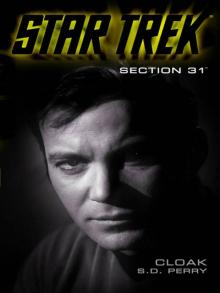 Cloak
Cloak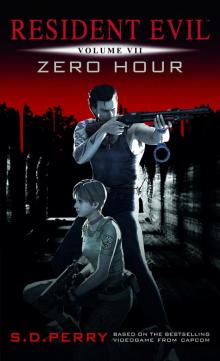 Resident Evil
Resident Evil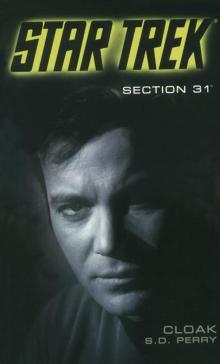 Star Trek - TOS - Section 31 - Cloak
Star Trek - TOS - Section 31 - Cloak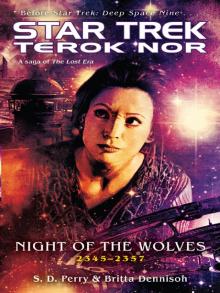 Star Trek: Terok Nor 02: Night of the Wolves
Star Trek: Terok Nor 02: Night of the Wolves